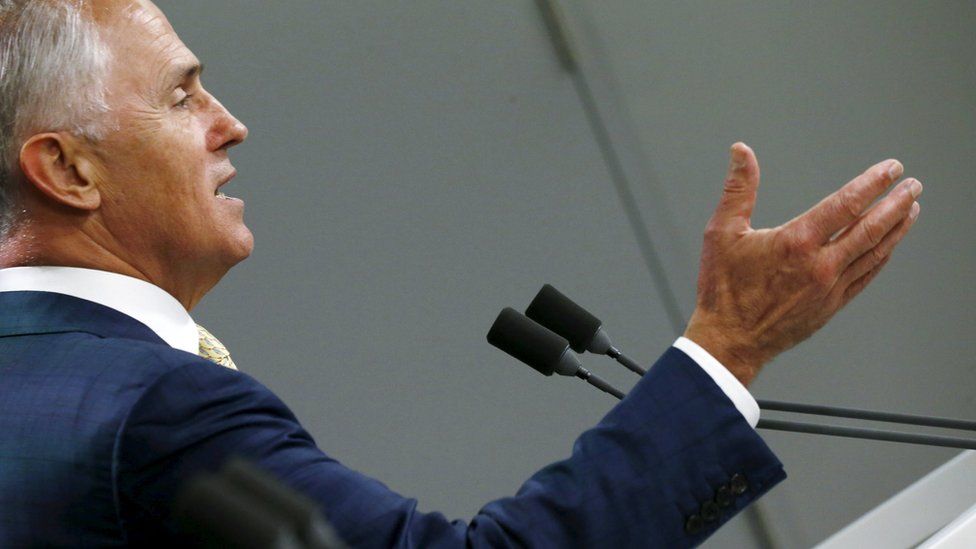Poll date for Australia election officially confirmed
- Published

Australians will go to the polls on 2 July after one of the longest election campaigns in the country's history.
Prime Minister Malcolm Turnbull has called the election several months early after the country's upper house repeatedly blocked legislation.
On Sunday the prime minister asked the Governor-General, Sir Peter Cosgrove, to dissolve both the lower and upper houses of parliament.
The economy, education and health are likely to dominate the campaign.
"The governor-general has accepted my advice to dissolve both houses of parliament effective tomorrow morning, and call an election for both houses, a double dissolution, on 2 July," said Mr Turnbull on Sunday afternoon.
Under Australia's political system, the governor-general is the representative of the head of state, Britain's Queen Elizabeth II.
In the House of Representatives all 150 seats will be contested, as well as the 76 Senate seats - the first time this has happened in an early election since 1987.
The opposition Labor Party needs to gain 21 seats in the lower house to win power, although changes to electoral boundaries mean it nominally holds three of those seats already.
At 56 days, it will the longest campaign since 1969, when the race lasted for 66 days.
Mr Turnbull, who heads a Liberal-National coalition, said the country faced a choice "to stay the course, maintain the commitment to our national economic plan for growth and jobs, or go back to Labor with its higher taxing, higher spending, debt-and-deficit agenda."
Labor leader Bill Shorten told the Seven Network on Sunday that Mr Turnbull and his government were "seriously out of touch".
Earlier he told a teachers' union meeting that he intended to make education an election focus.
"We will put the funding on the table to make sure every teacher in Australia gets the recognition and the support to back up what they do every day," Mr Shorten said.
'Growth' versus 'fairness'
Polls are predicting a tight race, with the latest Galaxy poll showing the parties locked at 50% of the vote each after preferences from minor parties are counted.
Treasurer Scott Morrison last week announced the government's budget, in what was widely regarded as a de-facto election campaign launch.
The government said it would cut the company tax rate in stages over 10 years and also provided modest tax relief for workers earning over A$80,000 per year.
There were no major tax cuts or cash handouts for voters, with the government keen to emphasise its economic management record.
The opposition strongly criticised the plan to roll out tax cuts to all businesses, including major corporations, rather than just small companies.
Labor's budget reply included large funding commitments for education and health, but the government says the plans are not properly funded.
Both parties intend to crack down on multinational companies who avoid paying tax in Australia by shifting profits offshore.
Early Australian election: key points
What is a double dissolution election?
Australia's constitution allows for an early election to be called when the Senate twice blocks a piece of legislation that has been passed by the lower house, the House of Representatives. Although ostensibly designed to resolve political deadlocks, in practice it has largely been used opportunistically by governments who see an advantage in going to the polls early.
What are the key policy battlegrounds?
The government will position itself as the party best placed to transition Australia from the mining boom through to a new phase of economic growth. Labor, conversely, will run on a "people first" platform of health, education and nation building.
How do the leaders stack up?
Mr Turnbull is well-known to Australians through his prominent public life as a barrister and advocate for the republic. Once a clear frontrunner, he has been losing ground to Mr Shorten in the polls.
Mr Turnbull will attempt to paint Mr Shorten as a union lackey who cannot manage the economy; Mr Shorten will say Mr Turnbull is an out-of-touch protector of greedy banks leading a divided party that stands for nothing.
How many seats does Labor need to win?
Labor needs to win 21 seats to take power, a swing of 4.3%.
- Published14 September 2015
- Published8 February 2015